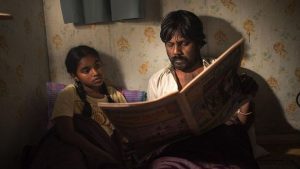
War cocoons “Dheepan.” It is present in the most literal of sense, both in a governing war in Sri Lanka and gang warfare in Paris. War is waged beneath the surface as well, both familial and personal. Even during the mundane moments, which are abundant in the film, war is just around the corner. One can never shake the feeling of impending doom.
Trying to escape the governing war in Sri Lanka are three refugees. All three don’t know one another, but come together posing as a family. They steal identities, now known as Dheepan (Jesusthasan Anthonythasan), Yalini (Kalieaswari Srinivasan), and Illayaal (Claudine Vinasithamby). They flee to Paris, first testing their fate on the streets hocking novelty items, then acting as caretakers at a run-down apartment complex. This is where they encounter their next war, of the gang variety.

Brahim (Vincent Rottiers) is one of the gang leaders, treating it like a business. He’s calm and calculated, with his moments of rage still feeling reigned in. This matches the tone set by Jacques Audiard, who views war as calm and calculated. Most of the action set pieces are contained in the finale. The entire film is slowly building towards those moments. We only see glimpses of the gang’s outbursts, in turn causing dread amongst the refugees and the audience. When the action hits, it’s sudden and jolting.
Audiard is more concerned with how war affects the human psyche. He focuses his attention on the makeshift family, examining how the war has damaged them. Dheepan tries to ignore his past warrior ways, feeling regret and sorrow for his actions. He tries to convince Yalini, and more importantly himself, that the war being waged in Paris isn’t like the one in Sri Lanka, but war is war. Once one is caught in the middle of it, there’s no escape.

Despite not being an actual family, the three refugees begin to act like one. At first to fool those around them, but slowly it morphs into actual compassion. Dheepan begins to have feelings for Yalini, who in turn breaks down his guard. There’s an amusing moment in which she explains to Dheepan that the French don’t have a different sense of humor, but that he simply doesn’t have one. Tender moments such as this go a long way in humanizing the characters, making their turmoil all the more stronger.
Audiard also brings Dheepan and Yalini together in order to show how war has damaged their perception of relationships. Dheepan snaps when Yalini defies him, whether it be in rejecting his advances or trying to flee from Paris. Yalini herself is prone to mood swings, especially towards Illayaal. She’s quick to hit her adopted daughter anytime she acts out or is perceived as acting out. Yalini doesn’t like nor ever wanted children and can’t bring herself to accept Illayaal as her own. Dheepan is shocked to discover she’s willing to leave the young girl behind so suddenly, not grasping that she only views her as a pawn in their game of survival.

Illayaal gets the short end of the stick. Audiard begins to toy with her emotional distress, such as her outbursts towards bullies in school. This falls by the wayside as the gang attacks pick up, with the young girl being reduced to fodder. Her existence in the second half of the film is to fuel the motivations of Dheepan and Yalini, which actually softens the impact a bit.
“Dheepan” is a raw and powerful film nonetheless! The pacing is intentionally slow, which will be a turnoff for many. I’d be lying if I said my attention wasn’t waning at times. This was a bold risk taken by Audiard, but it pays off in the end. The moments of chaos are more impactful due to the slow build, proving his viewpoint of war to be calm and calculated. The random bursts of mayhem wouldn’t be as effective had we not slowly been anticipating them.
Final Rating: B+
